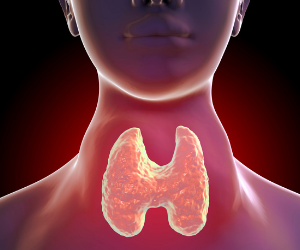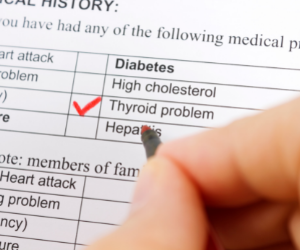Many women report fatigue, increased weight gain, and depression between the ages of 35 and 50. In some cases, the cause of these symptoms may be related to an over or underactive thyroid.

Your thyroid gland is a small, butterfly-shaped organ located in the front of your neck. A healthy thyroid is about 2-inches long and has two lobes that wrap around the windpipe. These lobes are connected by a small strip of thyroid tissue called the isthmus.
The thyroid gland plays a crucial role in the overall health and function of a woman’s endocrine system. Its main function is to help the body regulate its metabolism, which is the process TSH of converting the food you eat into energy. This is done by producing, storing, and releasing two main hormones called Triiodothyronine (T3) and Thyroxine (T4). It’s important the thyroid releases just the right amount of these hormones into the bloodstream because an imbalance can lead to unwanted symptoms.
The pituitary gland, a small pea-sized gland located at the base of your brain, helps regulate and keep the two hormones in balance with a hormone called the thyroid-stimulating hormone (TSH). For example, when T3 and T4 levels are too low, the pituitary gland releases more TSH to tell the thyroid to produce more thyroid hormones. If T3 and T4 levels are too high, it will release less THS to the thyroid in order to slow down hormone production.
Thyroid disease is a term used to describe any irregularities or imbalance in thyroid function. Although men can experience thyroid dysfunction, it is about 10 times more common in women.
If affected, a woman can experience problems with her menstrual cycle, getting pregnant, and/or problems during pregnancy that could impair the baby’s health.
Two main thyroid diseases are hyperthyroidism and hypothyroidism.
Thyroiditis occurs when the thyroid is irritated, swollen, or inflamed. Hashimoto’s disease is an auto-immune condition where the immune system gets confused and attacks the thyroid gland and is one of the biggest causes of Thyroiditis. This condition often results in lowered T3 and T4 production and eventually leads to hypothyroidism. On the opposite side, Graves’ disease is an auto-immune condition that causes the thyroid to become overactive, resulting in hyperthyroidism.
Determining if your irregular thyroid is a result of Hashimoto’s disease or Graves’ disease will help you and your doctor better treat and manage your condition and overall health.

A thyroid screening test is a blood test taken to measure the amount of TSH in relation to T3 and T4 hormones in the blood. Measuring the TSH level is the best way to initially test for proper thyroid function, as any changes in TSH can be an early warning sign of an abnormal thyroid. This is because changes in TSH levels will happen before the actual level of thyroid hormones (T3, T4) in the body become too high or too low. In most cases, a healthy TSH level indicates a properly functioning thyroid.
If a woman is experiencing symptoms of thyroid disease, has a family history of thyroid disease, or has already had a test result indicating a thyroid problem, more frequent testing will be required compared to a woman with no family history or symptoms.
Medical conditions like diabetes, age, medications, lifestyle, and if a woman is pregnant or postpartum should also be considered when determining the frequency of screening tests.
Here are some of the existing guidelines on thyroid screening:
Your Moreland OB-GYN physician can act as your guide as to when and how often thyroid screenings should be included in your annual care plan. Schedule your appointment now.
Symptoms of a thyroid disease are often similar to other medical conditions and stages of life, making it difficult to know if the issue is your thyroid or something else.
Your doctor at Moreland OB-GYN will work with you to understand your symptoms and determine if a thyroid screening is the right course of care for you.
Symptoms of an overactive thyroid (hyperthyroid) can include:
 Having an enlarged thyroid gland
Having an enlarged thyroid glandSymptoms of an underactive thyroid (hypothyroid) can include:
If your OB-GYN provider completed a thyroid screening and notices irregularities or evidence of thyroid disease, there are several treatment options. Treatment for an irregular thyroid will depend on the severity and underlying cause of your symptoms.
If you’re concerned you have a thyroid disorder, please schedule an appointment with your Moreland OB-GYN doctor. Our team of caring providers will take the time to discuss your needs and walk you through the process of thyroid testing and care if a thyroid disease is detected.
Phone: 262-544-4411
Fax: 262-650-3856
Monday-Thursday:
7:30 am – 6:00 pm
Friday:
7:30 am – 4:00 pm



